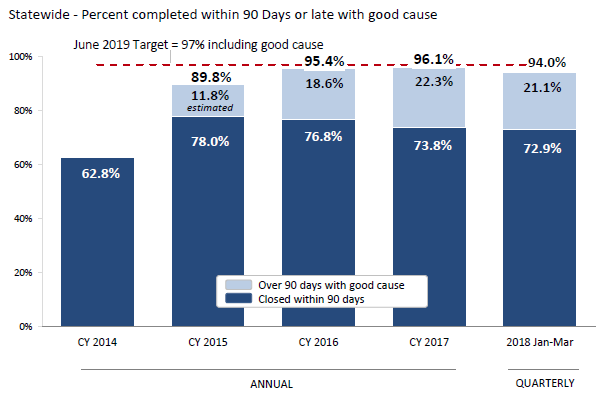Archived: Increase the percentage of adult abuse and neglect investigations completed within 90 days (or remaining open for "good cause")
By 2030, 20% of the state's population will be age 65 and over, and ensuring the safety of seniors and other adults who are vulnerable will become more challenging. Between 2008 and 2015, we have seen a doubling in the number of investigations of suspected abuse or neglect of vulnerable adults. Some of the increase is due to better public awareness and reporting of the problem. Abuse or neglect can occur in an individual's own home or in licensed or certified settings including; nursing homes, adult family homes, assisted living, and supported living for people with developmental disabilities and includes:
Physical, sexual, or mental abuse
Neglect
Self-neglect
Financial or personal exploitation
Abandonment
Timely initial response to reports of abuse and neglect is our top priority. In addition to responding promptly, completing investigations in a timely manner (less than 90 days) helps keep people safe and prevents abusers from caring for or working around other adults who are vulnerable.
 We take reports of abuse or neglect seriously and respond accordingly. We meet requirements to respond within 24 hours, 5 business days, or 10 business days, depending on the risk to the individual. We also offer protective services to victims when needed, as soon as possible. Although our initial response times are excellent, completing the investigation within 90 days from initial intake is often a challenge. Some investigations take longer than 90 days to resolve for “good cause”, such as coordinating with law enforcement, pending guardianships, and difficulty accessing witnesses or documents.
We take reports of abuse or neglect seriously and respond accordingly. We meet requirements to respond within 24 hours, 5 business days, or 10 business days, depending on the risk to the individual. We also offer protective services to victims when needed, as soon as possible. Although our initial response times are excellent, completing the investigation within 90 days from initial intake is often a challenge. Some investigations take longer than 90 days to resolve for “good cause”, such as coordinating with law enforcement, pending guardianships, and difficulty accessing witnesses or documents.
Issues include:
- Until spring 2014, the number of investigators had not kept up with the significant increase in investigations since 2008, due to an outdated workload model.
- Financial exploitation investigations have grown 101% between 2008 and 2015. Staff need specialized expertise to more quickly resolve these investigations, which require working with financial institutions and other record holders.
- For self-neglect investigations, determining whether individuals have diminished capacity to make decisions about finances or health care is complex and time-consuming, requiring working with families and individuals on alternative decision making, sometimes referring for capacity evaluations, processing guardianships and protective orders.
- Meeting the measure of 95% of investigations completed within 90 days is attainable assuming adequate staffing levels are reached and maintained, and good cause exceptions are considered. In the meantime, interim goals have been set in the field.
- Increasing the number of investigators by using an updated staffing model for investigations that keeps up with the level of increased workload, and aggressive hiring to reduce vacancies.
- Applying Lean management principles to streamline and reduce “touch time” at report intake.
- Improving training for investigators, including best practices in time management.
- Reviewing when investigations take longer than 90 days to resolve, if they remain open without "good cause".
- Improving data reporting to better track abuse and trends.
- Partnering with stakeholders and advocates to identify important issues we can work on together.
- Dedicating some new staff for the challenging and time-consuming work on financial exploitation and self-neglect cases, focusing on processing guardianships and protective orders.
If you suspect abuse or neglect please call 1-866-END-HARM (1-866-363-4276). (If the person is in immediate danger, call 911.) You do not need proof to report suspected abuse, and you do not need to give your name when you call.
If you have health and safety concerns about a specific nursing home, adult family home, assisted living, or other residential setting, contact the Complaint Resolution Unit at 1-800-562-6078.
To learn more about adult abuse and neglect, please visit our website at: Report Concerns Involving Vulnerable Adults
